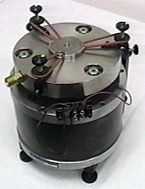Model 1000A & 1000AD Calibration Shakers

Bouche Labs Model 1000A & 1000AD Vibration Standard Calibration Shakers
Bouche Laboratories Model 1000A and 1000AD Vibration Standard Calibration Shakers provide accurate sensitivity and frequency response calibrations at frequencies up to 10,000 Hz and resonance frequency measurements at frequencies up to 65,000 Hz. The 1000AD provides a larger displacement for higher accelerations at low frequencies. The unique air bearing suspension virtually eliminates transverse motion and waveform distortion. The standard accelerometer built into the shaker armature is calibrated by the reciprocity method to provide a sensitivity uncertainty of 0.2% from 100 to 2,000 Hz and 0.5% from 2,000 to 5,000 Hz. Adapter bushings are supplied to permit calibration of almost any accelerometer by direct attachment to the armature/standard.
Armature With Built-In Accelerometer
| Measurement | Unit | 1000A | 1000AD | |
|---|---|---|---|---|
| DYNAMIC | CHARGE SENSITIVITY, typical | pC/g | 12 | 12 |
| Temperature Coefficient | %/°C | 0.05 | 0.05 | |
| FREQUENCY RESPONSE CALIBRATION | Hz | 10 to 10 000 | 10 to 10 000 | |
| RESONANCE FREQUENCY CALIBRATION | Hz | 1000 to 65,000 | 1000 to 65,000 | |
| AMPLITUDE LIMITS: | ||||
| Acceleration, continuous** | g | 20 | 20 | |
| Displacement, peak to peak | in/cm | 0.15/0.38 | 0.5/1.27 | |
| Dynamic Force, minimum | lb | 20 | 20 | |
| AMPLITUDE LINEARITY (0 TO 50g) | % | 0.5 | 0.5 | |
| ARMATURE TRANSVERSE MOTION, maximum | % | 5 | 5 | |
| TRANSVERSE SENSITIVITY | % | 5 | 5 | |
| ACCELERATION WAVEFORM DISTORTION, maximum | % | 1.5 | 1.5 | |
| ACCELEROMETER RESONANCE FREQUENCY | kHz | 80 | 80 | |
| ARMATURE RESONANCE FREQUENCY | kHz | 49.5 | 36 | |
| ELECTRICAL | ACCELEROMETER CAPACITANCE, typical | pF | 2,000 | 2,000 |
| ACCELEROMETER GROUND INSULATION, minimum | ohms | 10M | 10M | |
| DRIVE COIL RESISTANCE | ohms | 4 | 4 | |
| CHARGE SENSITIVITY STABILITY | % | +/-1 | +/-1 | |
| PHYSICAL | ARMATURE MASS, typical | gm | 140 | 170 |
| ARMATURE MATERIAL | Beryllium | Beryllium | ||
| ACCELEROMETER CONNECTOR | 10-32 coaxial | 10-32 coaxial | ||
| TEST ACCELEROMETER MOUNTING | 1/4-28, 10-32, etc. | 1/4-28, 10-32, etc. |
Shaker
| Measurement | Unit | 1000A | 1000AD | |
|---|---|---|---|---|
| PHYSICAL | MAGNETIC FIELD | Permanent magnet | Permanent magnet | |
| DIMENSIONS | in/cm | 9 x 7.6 x 7.8/23 x19 x 20 | 9 x 7.6 x 7.8/23 x19 x 20 | |
| SHAKER WEIGHT | lb/kg | 40/18 | 40/18 | |
| SHIPPING WEIGHT | lb/kg | 60/27 | 60/27 | |
| AIR SUPPLY INLET FITTING | 1/8-27 pipe thread | 1/8-27 pipe thread | ||
| AIR SUPPLY PRESSURE | psig | 1 to 10 | 1 to 10 | |
| ENVIRONMENTAL | ||||
| TEMPERATURE | °F/°C | -65 to +200/-54 to +93 | -65 to +200/-54 to +93 | |
| ALTITUDE | Unaffected | Unaffected | ||
| HUMIDITY | Accelerometer epoxy sealed | Accelerometer epoxy sealed |
** Note: Continuous operation at high acceleration for more than one minute will result in heat buildup due to the high armature current required. This will result in excessive heating of the integral accelerometer, affecting its sensitivity and increasing the uncertainty of the calibration. Normal calibration procedures should limit continuous operation at levels greater than 10g to less than one minute, with a 50% maximum duty cycle.
Accessories Supplied
- Accelerometer low noise cable assembly
- Adapter bushings for test accelerometer thread sizes 10-32, 6-32, 2-56
- Adapter stud, 1/4-28 to 10-32
- Height centering gage
- Hex allen wrench, 7/64 inch & 3/16 inch
- Pipe nipple, 3/8 inch
- Padded shipping and storage box
- Technical manual including assembly and installation instructions, electrical calibration, maintenance, spare parts and accessories, operating procedure, comparison calibration, accuracy and drawings.
OPTIONAL ACCESSORIES
Isolation mounted shaker pedestal (Part No. 10300), Fixture for reciprocity calibration of Model 1113DT Accelerometer (Part No. 10501).
Other Options (1000AD only):
- Calibration Services No. 3 and No. 6, extend frequency from 3 Hz to 15 000 Hz.
- Software 5000C improves uncertainty value from 3 Hz to 15 000 Hz.
CALIBRATION SUPPLIED
Reciprocity calibration of built-in standard accelerometer from 100 Hz to 5 000 Hz.
Accelerometer sensitivity and frequency response calibration from 10 Hz to 10 000 Hz.
Frequency response calibration from 1 000 Hz to 50 000 Hz.
NOTES
Continuous operation at high acceleration for more than one minute will result in heat buildup due to the heating effect of the high armature current required. This will result in excessive heating of the integral standard accelerometer causing its sensitivity to shift and increasing the uncertainty of the calibration. Normal calibration procedures should limit continuous operation at levels greater than 10g to less than one minute, with a 50% maximum duty cycle.
The superiorities of the Model 1000A/1000AD over conventional shakers:
- The Bouche Labs Vibration Standard Calibration Shakers have a unique beryllium armature which has a fn_nn of 49.5 kHz in the Model 1000A and 36 kHz in the Model 1000AD, the highest of any electromagnetic shakers on the market. Compared to all of the other useful engineering metals, only beryllium has an outstanding "square root of K over M", producing the high fn_nn. (The in-house NIST shaker is approximately 30 kHz, with an alumina-ceramic armature.) The high fn_nn permits: a) moving the "trouble spots" from the amplified 3rd & 5th harmonic up and out of the useful usual frequency range. Other shakers fn_nn is about 6 kHz and the "trouble spots" are at 2,000 Hz for the 3rd harmonic and 1,200 Hz for the 5th harmonic. b) permitting the plot of the test accelerometers resonance curve. The fn_nn (precisely measured with a DMM) and "Q" make a finer "fingerprint" by which to recognize later concealed-damage, even though subtle or minor, to the test accelerometer.
- The air bearings have 1 mil clearance and proper air pressure provides transverse motion that cannot be measured. The 5% maximum on the data sheet is a conservative spec since transverse motion instrumentation is a problem.
- Other shakers also have "trouble spots" in the 20 to 40 Hz region, depending on their suspension flexure first resonance. Non-linearities put distortion into waveshape. Cross-motion is the norm since the different flexures cannot be built with precisely the same fn_nn. The Bouche "suspension" is almost non-existent. It is long and has very soft O-rings of near zero mass, serving only to keep the armature from falling out of the shaker.
- There is no flexure trying to decouple the armature's stiffness from the armatures. The standard accelerometer is built into the armatures and their resonance frequencies are nominally 80 kHz.
BOUCHE LABS reserves the right to change these and any other specifications without notice.

